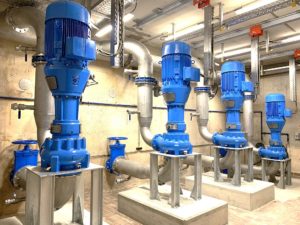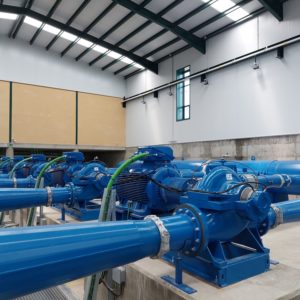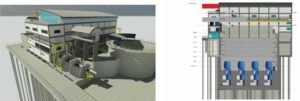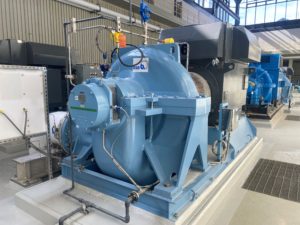Netzsch Mobile Rotary Lobe Pump Supplies Wastewater Without Interruption and Quietly
For the majority of people, the tolerance level for noise is approximately 100 decibels (dB). The approximate level for a pneumatic drill. Damage to the ears can occur at 85 dB. However, noises in conjunction with construction and servicing tasks cannot always be prevented – in particular in residential areas, this is a big problem.
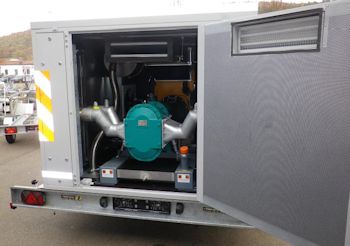
Therefore, one of the largest wastewater companies in Germany had a special bypass system developed for its pumping stations which only generates a maximum of 52 dB. The unit is also used for channel maintenance as a bypass, the diversion of waste water during the revision of the channel. The Tornado rotary lobe pump from Netzsch Pumpen & Systeme GmbH used, together with the diesel engine, has been installed on a trailer in order to ensure flexible transportation to the locations of use. In addition, multiple safety components also ensure continuous operation of uninterrupted delivery.
A network of more than 100 pumping stations makes sure that millions of cubic metres of wastewater can be channelled into the sewage treatment plants of the company annually. Failures must be prevented as much as possible, because congestion of the contaminated water could cause big problems for the neighbouring buildings and adjacent land. In order to prevent that, the stations must be regularly maintained and replace during this time by mobile delivery systems. However, the noise pollution occurring through this would be unbearable, in particular in the residential areas. Thus the operating company tendered nationwide for the development of a pumping unit with noise damping, that is mobile and robust.
Exacting demands on performance and noise level
In order to be able to operate independently of power and other connections, the new system should be driven by a diesel engine. Simultaneously, due to reasons of noise protection, a maximum of 52 dB should be generated during operation – the lowest level that was technically possible. In order to make application as easy as possible,the pump should be regulated fully automatically, the delivery capacity should be a maximum geodetic suction height of 6 m at up to 220 m³/h. Further requirements were, a total weight of 3000 kg and continuous operation for a minimum of eight hours.
The decision was made for a Tornado XLB-4, a positive displacement pump that, due to its robustness, is used frequently in the wastewater and sewage sector: The delivery chambers, between its multi-blade spiral lobe rotor, feature a large ball passage which can also deliver lumpy media without a risk of blocking. The pistons themselves are rubberized, wear-resistant nitrile rubber that also resists abrasive liquids for a long period and, thus, ensures a continuous, stable sealing line between the suction and pressure side. This sealing is not only decisive for the delivery capacity, but also permits the pump to generate a vacuum through which the wastewater can also be automatically syphoned through greater heights and without a break in delivery.
Resistant material and multiple protection systems for high operating reliability
In order to make maintenance and servicing of the system as easy as possible, the pump is constructed so that disassembly of the cover gives free access to the complete delivery chamber. In this way, the lobe rotor can be easily replaced as required, together with the mechanical seals. Special tools or a workshop are not required. Due to the open access, cleaning is also significantly easier in comparison with other designs. Because the pump is principally used for outside applications as a mobile unit, this easiness to service is an important benefit for the staff of the sewage company, from whom Netzsch has in advance trained approximately 20 in operating and maintaining the system.
With regard to the operating reliability, the pump and gear chambers of the Tornado are strictly separated from one another by the construction, which excludes ingress of the medium into the timing gear. Thus, possible failure of the shaft seal is prevented, which could instantly result in total damage to the pump in commercial terms, which would most probably be the case without this safety feature. Furthermore, in order to increase the safety against failure, the conveying system for this application has other safety systems: Contact manometers monitor the prevailing pressure ratios and automatically regulates the pump, by overpressure or vacuum. Furthermore, a leakage detector is installed, as well as a temperature sensor, which continuously checks the heat development in the pump chamber. Thus, the start of a dry run is detected, whereby the system automatically shuts down.
Pump trailer with sound insulation operates with no problems since commissioning
Due to its compact dimensions, the rotary lobe pump, together with its extra-quiet diesel engine, is installed on a single-axle trailer. Thereby, hollow elements in the support frame serve as the fuel tank with a capacity of 120 l. So that continuous use of the diesel aggregate in residential areas does not present a problem, the exhaust pipe is routed downwards and has a plug and socket connection. Thereby, as required, a 2 m longer hose can be connected, through which the exhaust gases can be arbitrarily routed.
In order to maintain the required noise limit value of less than 52 dB, a noise-insulated housing, made from 100 mm thick mineral-fibre mats, has been installed over the complete construction. This has been provided with warning hatching and an orange flashing light, because the trailer primarily stands on the road. For cooling the machine, the developers from Netzsch integrated a fan system in the case. In addition, two LED indicators have also been installed to illuminate the inside of the trolley as required. During operation, the fan and LEDs are supplied by the battery and alternator. When not operating, the batteries are charged through an external charging cable. Due to the height-adjustable towbar replaceable ball head or drawbar eye, the trailer can be towed by a car and lorry. Thus, the Tornado can be flexibly transported to each location.
In the meantime, already for a year, the wastewater company uses the sound-insulated pump trailer. There were no malfunctions during the time. In addition to the robust construction, the automatic control using a submersible sensor also contributes: This measures the pressure that charges it and from this exactly determines the height of the water column above it. Based on this, the controller selects the appropriate operating parameters. Depending on the setting of the speed between 220 and 430 rpm, the bypass pumps deliver 100 to 220 m³ wastewater per hour. The residents hardly notice a thing – neither from the backwater nor the quiet machines on the road.
Picture: The particularly robust rotary lobe pump also delivers aggressive, lumpy wastewater with no problem. Multiple safety systems, such as pressure, temperature and
leakage monitoring, also provide high operating reliability. (Source: Netzsch
Pumpen & Systeme GmbH)

